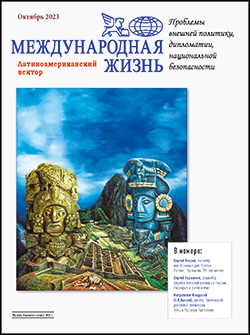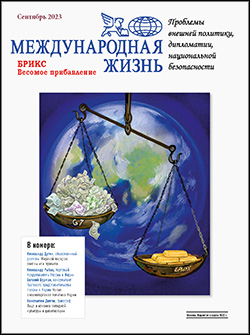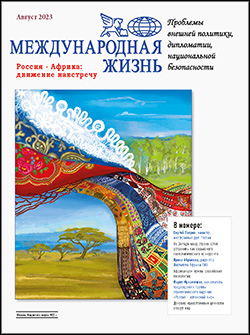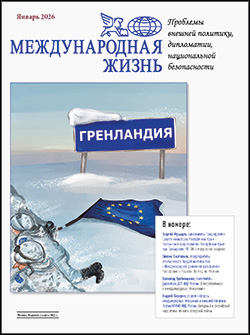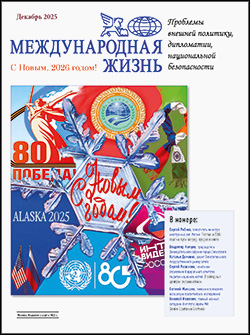POLICY
Alexey Drobinin. Lessons from history and the image of the future: reflections on Russian foreign policy
It so happened that our country is again is experiencing a turning point in its more than a thousand years of history. We have to deal with the aggressive reaction of some external players to absolutely justified actions to protect vital interests in the western direction. A man-made crisis of the European security and everything international order formed based on the results Second World War.
Key words: multipolar world order, globalization crisis, scientific and technological revolution, cultural and civilizational factor, concepts foreign policy of the Russian Federation.
Valery Kashin. Russia - India: towards establishment diplomatic relations
It is symbolic that diplomatic relations between our countries were established on April 13, 1947, within four months before India officially declared its independence at midnight on August 14-15 of the same year. Since October 2000 Russia and India are strategic partners. In December 2010, our strategic partnership was raised to the level of special and privileged.
Key words: Stalin and India, establishment diplomatic relations, Novikov - first ambassador, Russian-Indian cooperation.
DIPLOMACY
Pavel Mamontov, Arkady Ryabichenko. A reliable tool in ensuring the life of the western outpost of Russia. To the 30th anniversary of the Representative Office of the Russian Foreign Ministry in Kaliningrad
On August 14, 1992, a Representative Office of the Russian Ministry of Foreign Affairs was established in Kaliningrad. Long-term assistance to regional government bodies in the development of external relations reliably ensures national interests and creates favorable conditions for the life of the exclave region of Russia.
Key words: Representation of the Russian Foreign Ministry in Kaliningrad, Kaliningrad region.
THE WORLD AROUND US
Yuri Sayamov. Bioethics in International Relations
The concept of bioethics has evolved over time from ideas associated mainly with the ethics of medicine and biomedical research, to an awareness of the presence and significance of bioethical issues in almost all areas related to human activity and society and the life sciences. Bioethics today covers “views of morality, decision making, behavior, and policy.”
Key words: bioethics, biohistory, biopolitics, biopower, international relations
Leonid Golovko. Judicial and legal dimension of the confrontation with the West
Nostalgic feelings about the passing of the “era of the ECHR” are understandable and humanly explainable, but one should hardly continue to believe in his altruism and desire to strengthen the rights of the “ordinary Russian”. We need to think not about nostalgia or fading illusions, but about the risks, albeit hypothetical, that are posed by the careless preservation of international platforms that can be used for additional judicial and legal pressure on Russia in the spirit of “international criminal justice.”
Key words: international justice, Nuremberg Tribunal, ICC, ECHR, ICTY.
Dmitry Otinov. Third round of GERD completion: is it possible to break the impasse?
With the onset of summer 2022, the long-standing dispute over the Renaissance Dam in Ethiopia has once again become relevant, becoming one of the main challenges to stability on the African continent.
Keywords: Ethiopia, Renaissance Dam, Hydroelectric power station, Egypt and Sudan.
"ROUND TABLE"
“Orthodox civilization – internal and external challenges”
Many people say: “Tell me who your friend is, and I will tell you who you are.” You can also say the other way around: “Tell me who your enemy is, and it will be even clearer to me who you are!” The absence of an enemy, both for a person and for an entire people, is a homonym for a certain failure, intellectual, metaphysical, spiritual. It is very important to determine who we are and who our enemies, the leaders of evil, are. Where is our format, where are our capabilities? Where our territory ends and the territory of alienation begins.
Keywords: Orthodox civilization, Russian Orthodox church
ОPINION
Yuri Shafranik. Brussels cabbage cannot replace natural gas
In the 70-80s of the last century, we were able to create the wonderful West Siberian oil and gas complex, and now we are faced with a very serious, but still less ambitious task. However, you will have to really mobilize. We are obliged to act without looking back at the contradictory decisions of Washington and Brussels, who are entangled in energy policy. It is to act, and not to trudge under the banners of Western propaganda slogans
Key words: oil, gas, energy resources, coal industry, oil and gas market. words: Ethiopia, Renaissance Dam, Hydroelectric power station, Egypt and Sudan.
HISTORICAL MEMORY
Metropolitan of Penza and Nizhnelomovsky Seraphim (Domnin), Kira Aristova. The Russian Orthodox Church as a guarantor of the unity of the Russian world in the Baltics
Being a prominent church leader, diplomat, bilingual (Russian and Latvian), with the gift of speech, Archbishop John, for the first time in church history, decides to run for the Seimas in defense of the interests of Orthodoxy, and therefore the interests of the Russian world.
Key words: Archbishop John (Pommer), Russian Orthodox Church, LOC, Russian World.
HISTORY MILESTONES
Ivan Kravchenko. Averell Harriman. Oligarch in the diplomatic service
Leaving the USSR in August 1942, W. Churchill and A. Harriman enjoyed what they thought was a major political victory. Stalin had to reluctantly accept their decision not to open a Second Front until next year. That is, in other words, to come to terms with outright political betrayal, which is prolonging the war and dooming the USSR to multimillion-dollar losses.
Key words: Averell Harriman, Lend-Lease, Second Front.
Andrey Satarov. On the relations between the Ottoman Empire and the Funj Sultanate in the 16th-18th centuries.
After the fall of the Mamluk Sultanate in Egypt, the most powerful states in Northeast Africa at the beginning of the 16th century included the Ottoman Empire, the Funj Sultanate, the Adal Sultanate and Ethiopia.
Keywords: Ottoman Empire, sultanate funj, XVI-XVIII centuries, Sultanate in Sennar, Suakin, Eyalet Habesh, Sudan, Salman Reis, Evliya Celebi.
Читайте другие материалы журнала «Международная жизнь» на нашем канале Яндекс.Дзен.
Подписывайтесь на наш Telegram – канал: https://t.me/interaffairs

 07:54 22.08.2022 •
07:54 22.08.2022 • 